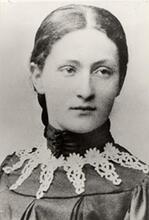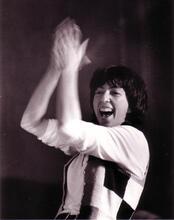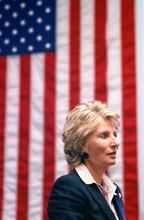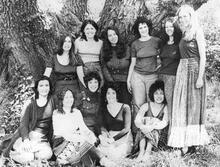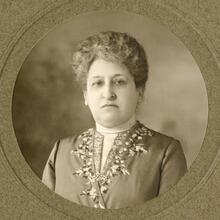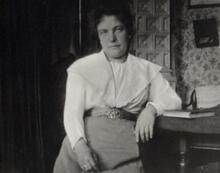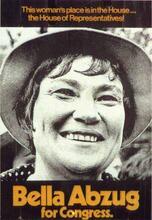Käte Frankenthal
A stubborn nonconformist from an early age, Käte Frankenthal rejected her parents’ middle-class Jewish lifestyle and matriculated at the University of Kiel against their wishes, completing her doctorate in medicine in 1914. Having volunteered for the Austrian army during World War I, Frankenthal returned to Berlin and found work at Charité Hospital as a resident directing a women’s ward and treating tuberculosis patients. Soon after she established her own private practice. As a Social Democratic physician and politician, Frankenthal became active in sex reform legislation in Germany, advocating for the abolishment of laws against abortion and homosexuality. She also played a prominent role in the Federation of Women Physicians. Frankenthal emigrated to New York in 1936, where she set up a private psychoanalytic practice.
“I am [a] Jewish, intellectual, socialist [woman] - a threefold curse! By fate it was destined only that I be born a Jewish woman.” With these words, Käte Frankenthal, physician and former Berlin Social Democratic municipal councilor, began her prize-winning memoir, written in New York in 1940 for a Harvard University essay competition on life in Germany before and after 1933. As an educated, professional Jewish woman and a left-wing political activist, Frankenthal fit every anathematized category in Nazi-dominated Europe. After Hitler came to power, she quickly realized that she had to escape from Germany in order to save her life.
Education & Military Work
Käte Frankenthal was born in Kiel, Germany, on January 30, 1889, as the second of three daughters of Julius Frankenthal and his wife, Cäcilie, née Goldmann. Her father, a successful businessman, was president of the Jewish community of Kiel for many years; her mother was a devoted housewife. At an early age, Käte rejected her parents’ middle-class Jewish lifestyle and values; she was determined to become independent and self-supporting. After attending a girls’ school in Kiel and then a Jewish boarding school in Wiesbaden, which emphasized foreign languages and social graces useful for marriage, she decided that instead of finding a husband, she wanted to attend university and become a physician. Against her parents’ wishes, she prepared for her university entrance examinations with private tutoring and special “cram courses” for women in Berlin. She also started to drink and smoke; later she learned fencing, boxing, and ju-jitsu to prove that she was strong and healthy and to defend herself against men. She was an avid sportswoman and horseback rider.
After passing her Abitur examination at the age of twenty, she matriculated at the University of Kiel, and then studied in Heidelberg, Erlangen, Munich, and Vienna, before completing her doctorate in medicine in Freiburg in 1914. After the war broke out, she accepted a residency at a large Berlin hospital, but soon decided to take a position as a rural doctor, replacing a man who had been drafted into the army, because she could earn more money. She treated male as well as female patients, since no other doctors were available. The presence of a woman physician, especially one who smoked cigars and drank beer and whisky in the local tavern, caused a minor scandal in the small town. Frankenthal then applied for a job as a military physician, but since the German army accepted women only as nurses, not physicians, she volunteered for the Austrian army instead and served in the Carpathian Mountains and then on the Balkan front, finding herself the only woman in the barracks.
Initial Career & Relationship to Judaism
Towards the end of the war, Käte Frankenthal returned to Berlin, where she worked at the Charité Hospital as an unpaid research assistant at the Institute for Cancer Research and as a resident directing a women’s ward and treating tuberculosis patients in a clinic. Having become an active member of the Social Democratic Party, she was in charge of a first aid station helping the injured in the 1919 civil war, working with other medics under a Red Cross flag. In 1924, when women physicians were dismissed from their positions at the Charité in order to make room for war veterans, Frankenthal continued to do research in the Pathological Institute and to work in the University Women’s Clinic. She also established her own private practice.
Frankenthal identified herself as a Jew by fate, but not by religion or nationality. She decided at an early age not to marry, dismissing the possibility of intermarriage and claiming to have no love for Jewish men and to be “turned off by anything Jewish in appearance or manner.” Rejecting the idea that Jews should have a monopoly on her interest, she formally left the official Jewish community and declared herself konfessionslos (without religion) in 1923, after the death of her parents.
Social Democratic Politics
As a physician as well as a Social Democratic politician, Käte Frankenthal became actively involved in the campaign for sex reform legislation in Germany, advocating rescinding the laws against abortion and homosexuality and promoting the establishment of marital counselling bureaus to provide sex education and birth control advice. In 1928, she gave up her busy medical practice in order to become the municipal physician for the working-class district of Berlin-Neukölln. Frankenthal played a prominent role in both the Federation of Women Physicians and the Association of Socialist Physicians in Germany, putting pressure on her non-Jewish and male medical colleagues to support the abolition of the anti-abortion clause, Paragraph 218, of the German Constitution.
Frankenthal served as a Social Democratic municipal deputy representing the Tiergarten district in the Berlin City Council from 1925 to 1931 and was elected to the Prussian Landtag (provincial diet) in 1930. In 1931, she left the German Social Democratic Party and joined the more leftist Socialist Workers Party, briefly serving on its executive board. Dismissed from her job in March 1933, Frankenthal managed to escape arrest for her political activities by fleeing to Prague, and later to Switzerland and Paris, before emigrating to the United States in 1936.
Emigration to New York & Legacy
Initially, she had a difficult time finding work and adjusting to her new life in New York. For a brief period, she even sold ice-cream bars on street corners and peddled stockings door to door to try to make ends meet. After requalifying as a physician and training as a psychoanalyst, she eventually set up a private psychoanalytic practice in New York, specializing in marriage counselling and family therapy. She also worked with Jewish Family Service.
Käte Frankenthal was a large and physically imposing woman; her bearing was manly and her attire often masculine. She was stubborn, assertive and staunchly independent; her private life was strictly private and she had no intimate lasting friendships. The greatest loss in her life was leaving Germany and giving up her active involvement in politics and public health. She never became fully Americanized and traveled to Germany often after the war. Although she decided not to return to Berlin to live, she received reparations and a pension from her homeland; the City of Berlin honored her on the occasion of her 85th birthday. Living on her own in good health until almost the end, Käte Frankenthal died of arteriosclerosis in New York on April 21, 1976, at the age of 87. She was a truly remarkable and formidable woman with a strong commitment to feminism, socialism, and helping the less fortunate.
Selected Works by Käte Frankenthal
Houghton Library, Harvard University, Boston, MA, 57M-203, bMS Ger91, Käte Frankenthal, #67.
Der dreifache Fluch: Jüdin, Intellektuelle, Sozialistin. Edited by Kathleen M. Pearle and Stephan Leibfried. Frankfurt: Campus, 1981.
“Berlin, 1933” and “Paris-Switzerland-Prague.” In Mark M. Anderson, ed. Hitler's Exiles. New York: The New Press, 1998, 28–34 and 137–145.
“Ärtzeschaft und Faschismus.” Der sozialistische Arzt 8 (1932); A Democratic System of Public Health for Germany. New York: N.p., 1945.
“The Role of Sex in Modern Society.” Psychiatry 8 (1945): 19–25.
Background for Tomorrow. New York: Vantage Press, 1953.
“Women in Industry—Its Effects on Family Health.” Acta Medica et Sociologica I, 1–3 (1962): 313–320.
“Autohypnosis and Other Aids for Survival in Situations of Extreme Stress.” International Journal of Clinical and Experimental Hypnosis 17 (1969), 153–159.
Freidenreich, Harriet Pass. Female, Jewish, and Educated: The Lives of Central European University Women. Bloomington: Indiana University Press, 2002.
Freidenreich, Harriet Pass. “Jewish Identity and the ‘New Woman’: Central European Jewish University Women in the Early Twentieth Century.” In Gender and Judaism. Edited by T.M. Rudavsky, 113–22. New York: NYU Press, 1995.
Grossmann, Atina. Reforming Sex: The German Movement for Birth Control and Abortion Reform, 1920–1950. New York: Oxford University Press, 1995.
Kaplan, Marion A. The Making of the Jewish Middle Class: Women, Family and Identity in Imperial Germany. New York: Oxford University Press, 1991.
Wickert, Christl. Unsere Erwählten: Sozialdemokratischen Frauen im Deutschen Reichstag und im Preussischen Landtag 1919 bis 1933. 2 vols. Göttingen: Sovec, 1986.
Wickert, Christl. “Sozialistin, Parlamentarierin, Jüdin. Die Beispiele Käte Frankenthal, Berta Jourdan, Adele Schreiber-Krieger, Toni Sender und Hedwig Wachenheim.” In Juden und deutsche Arbeiterbewegung bis 1933. Edited by Ludger Heid and Arnold Pauker, 155–164. Tübingen: Mohr, 1992.
Wickert, Christl. “Exile or Emigration: Social Democratic Women Members of the Reichstag in the United States.” In Between Sorrow and Strength: Women Refugees of the Nazi Period. Edited by Sibylle Quack, 325–340. Washington/Cambridge: Cambridge University Press, 1995.
Pross, Christian, and Rolf Winau, eds. Nicht misshandeln: Das Krankenhaus Moabit, 58. Berlin: Frolich & Kaufman, 1984.
Dick, Jutta and Marina Sassenberg, eds. Jüdische Frauen in 19. und 20. Jahrhundert, 122–124. Reinbek bei Hamburg: Rowohlt, 1993.
The International Biographical Dictionary of Central European Emigres. Edited by Sybille Claus. vol. I, 190. Munich: N.p., 1980.
Lowenthal, Ernst G. Juden in Preussen, 64. Berlin: Reimer, 1981.

